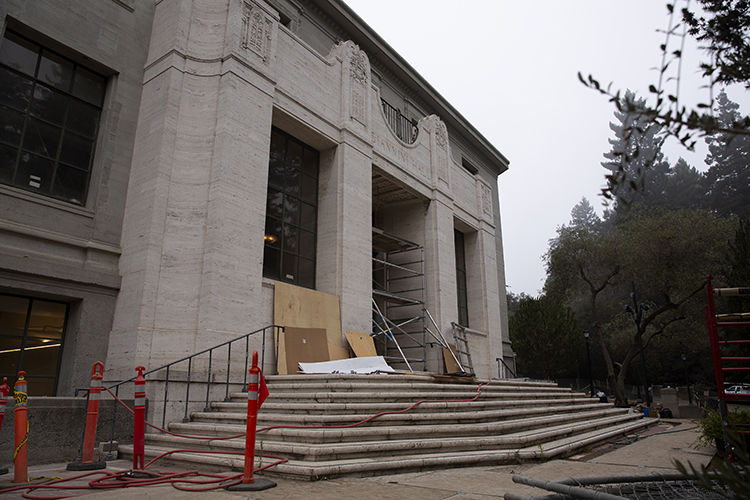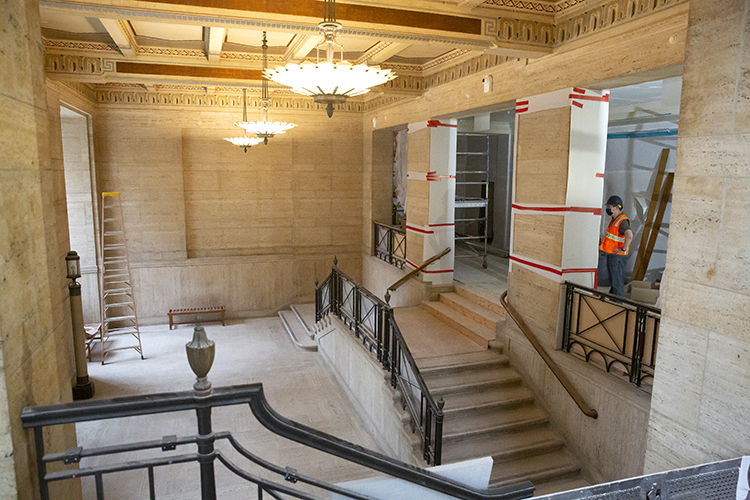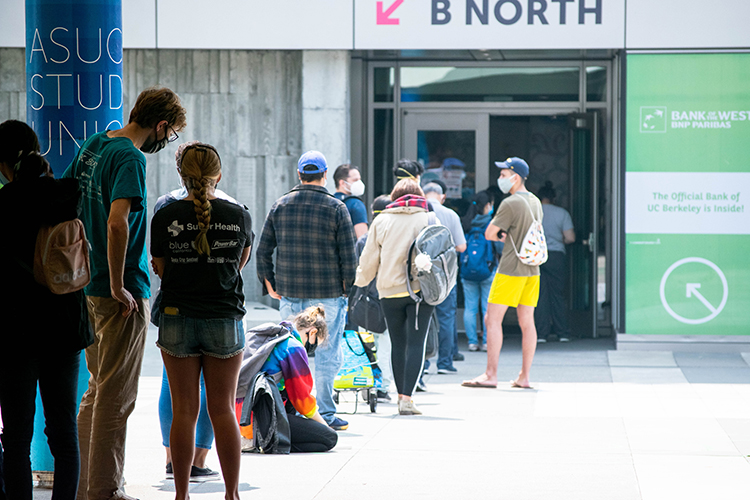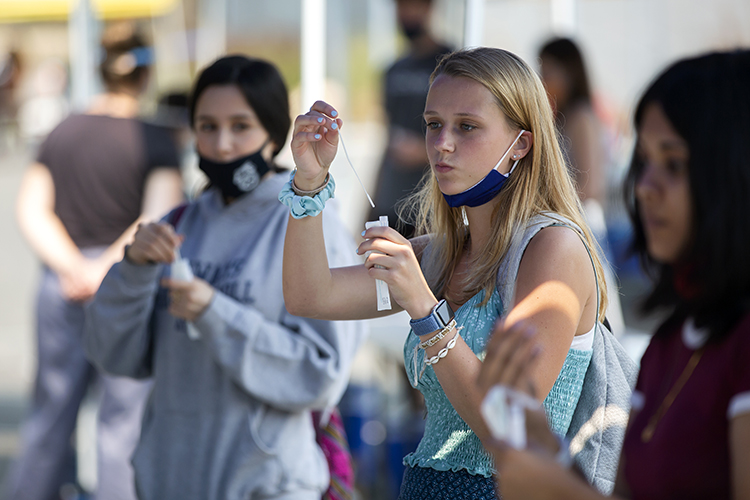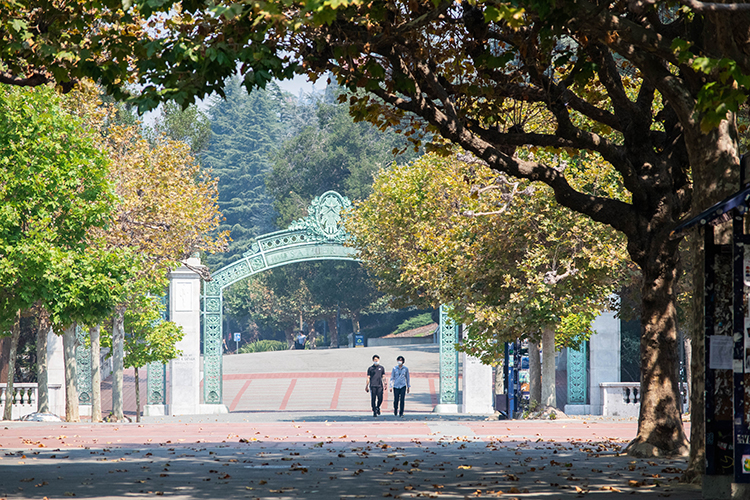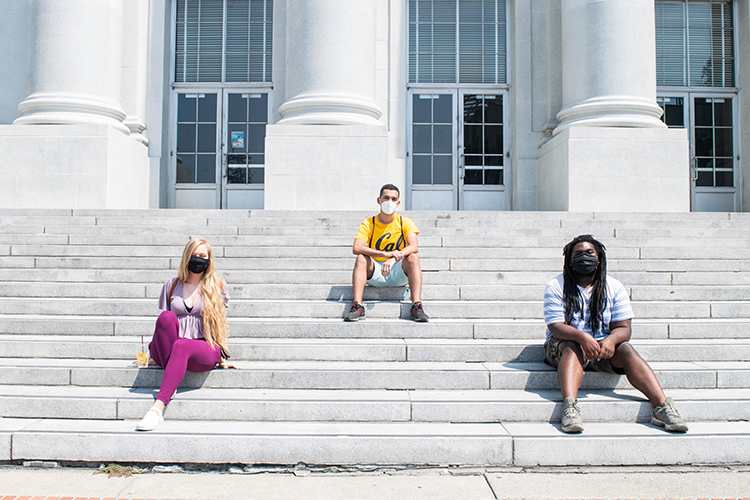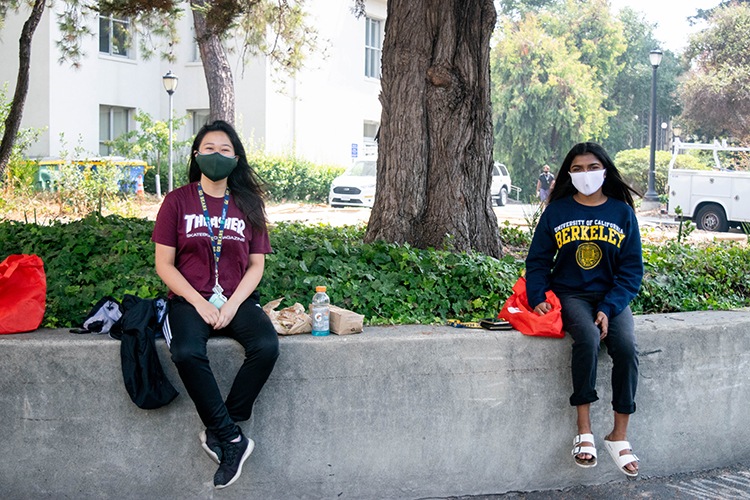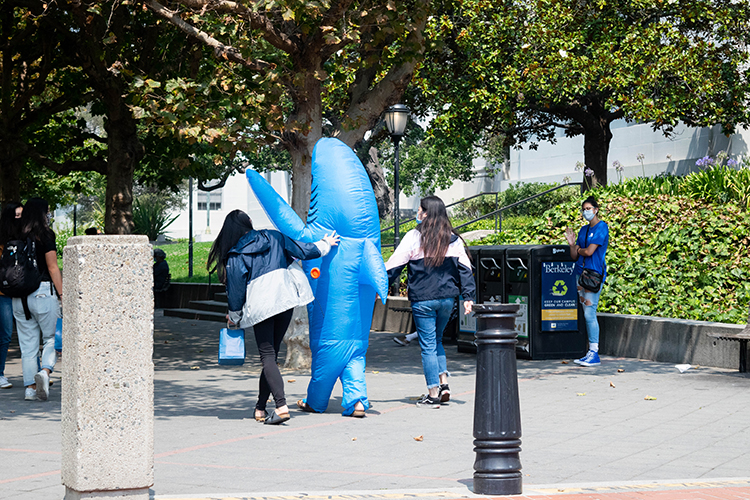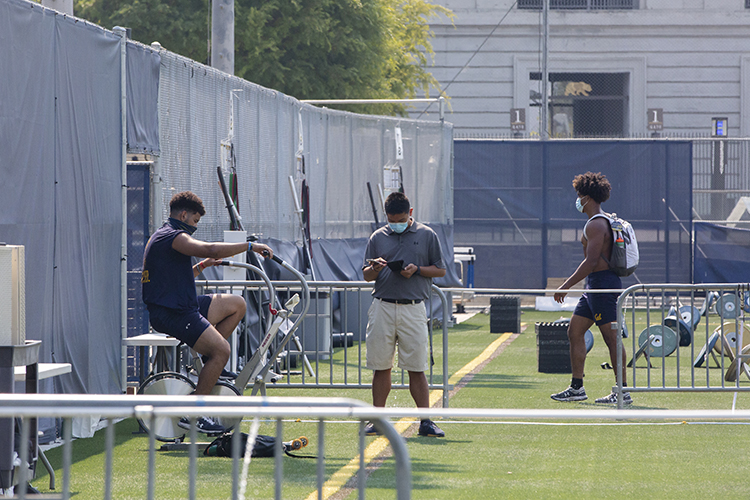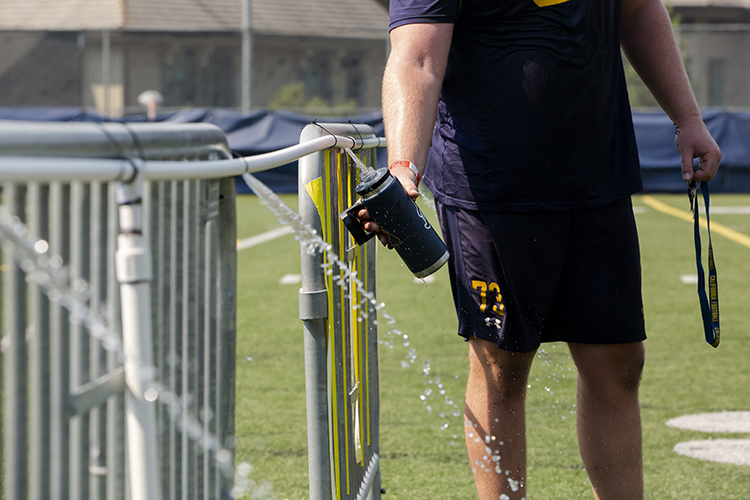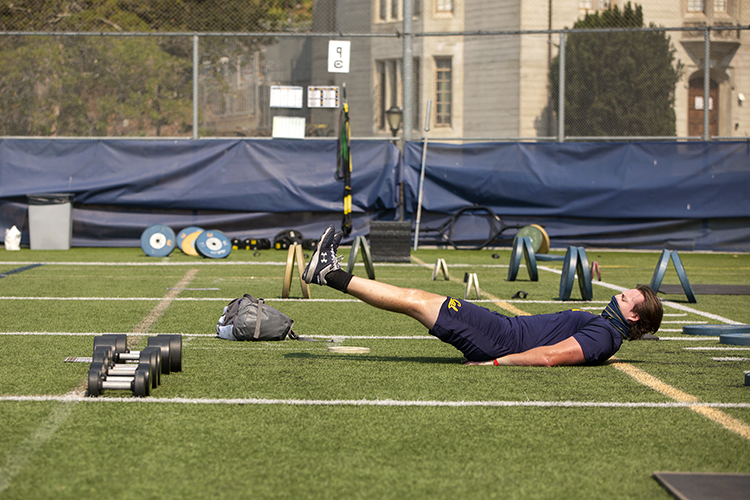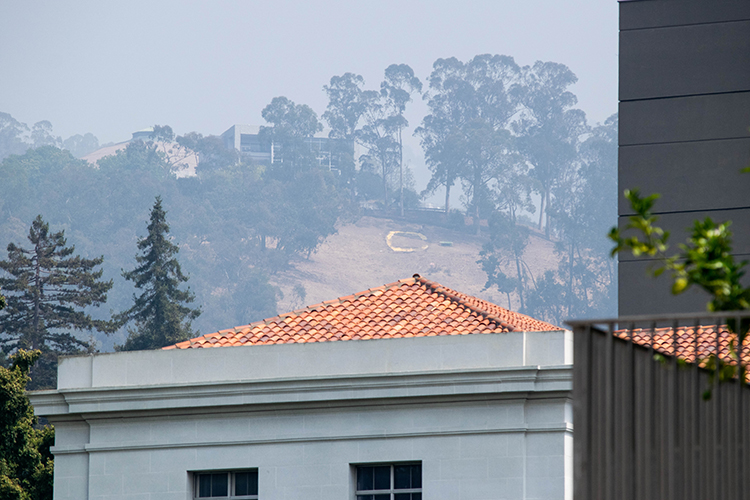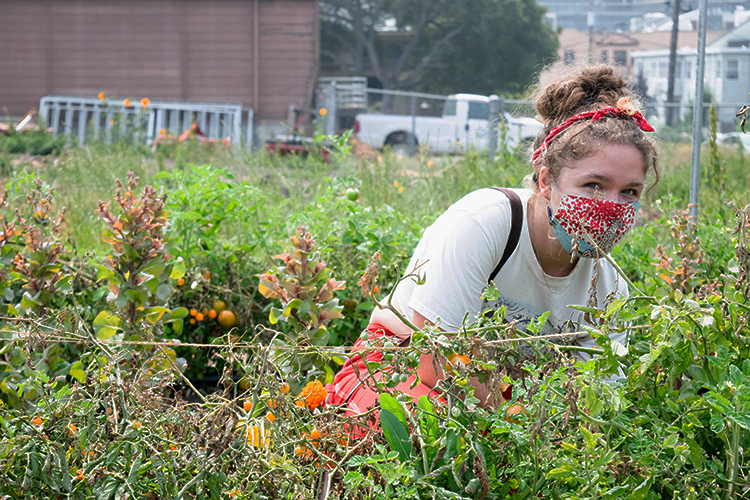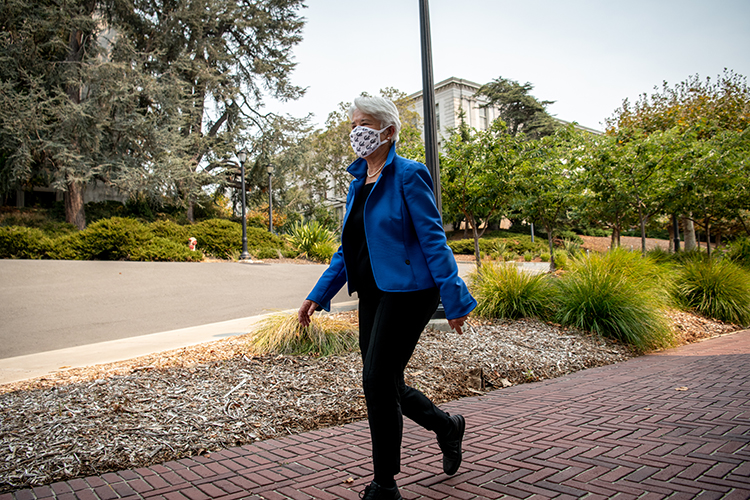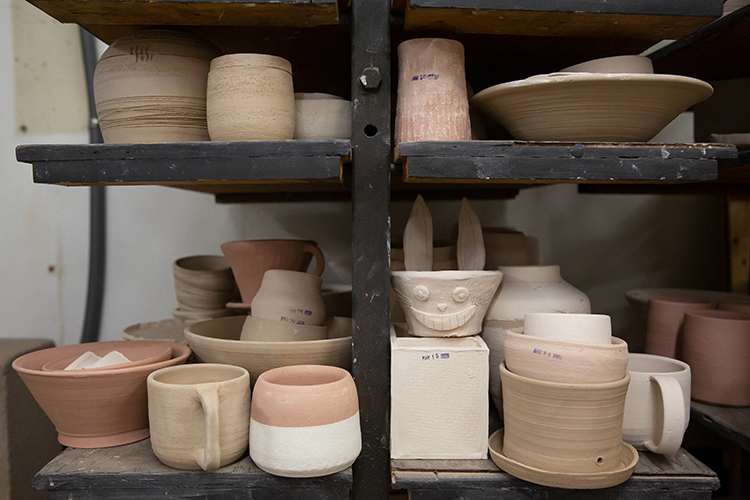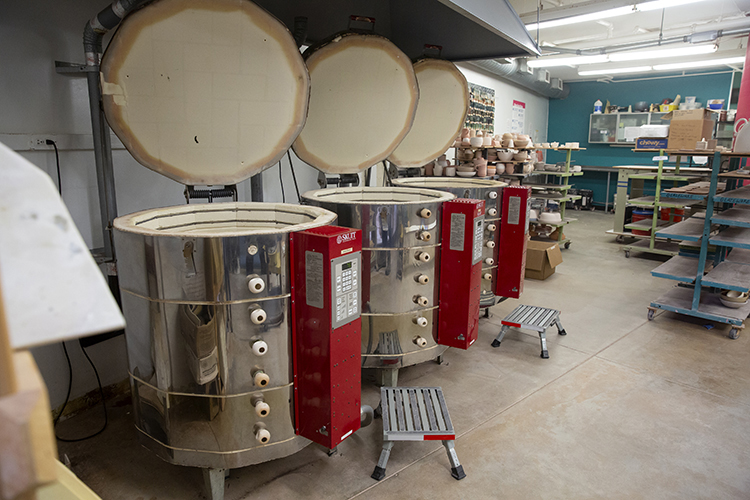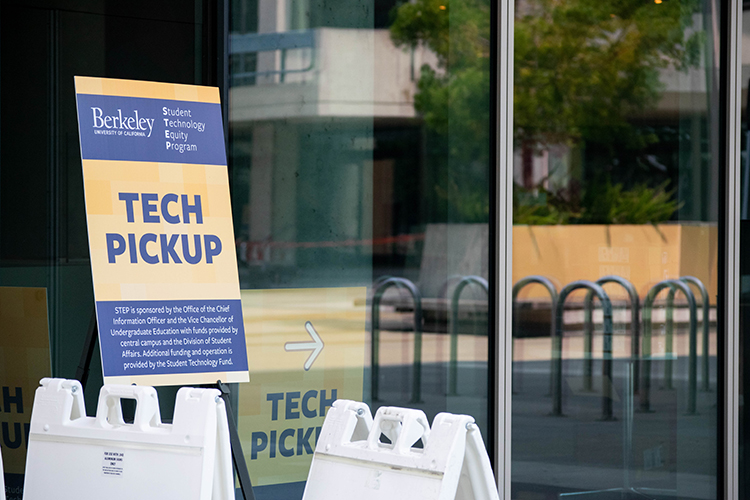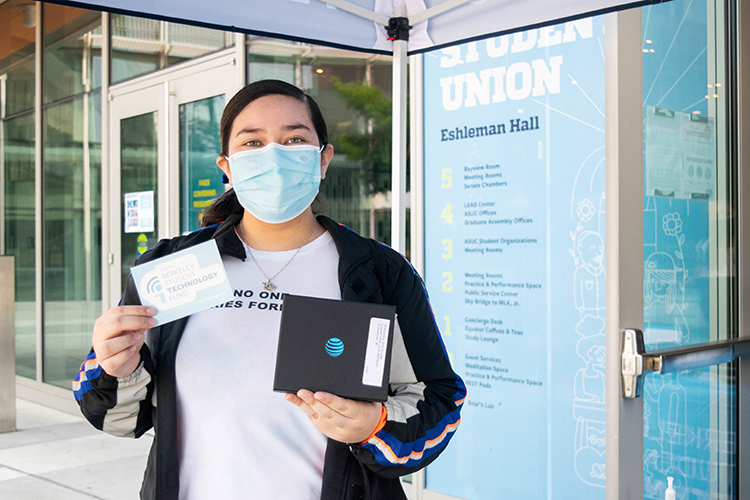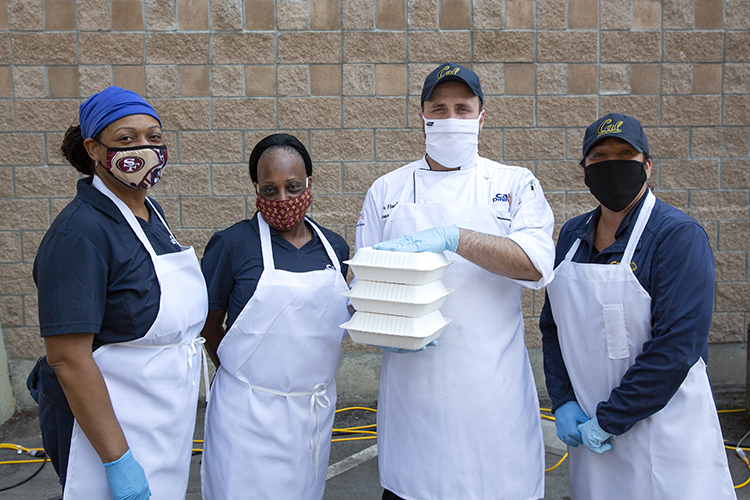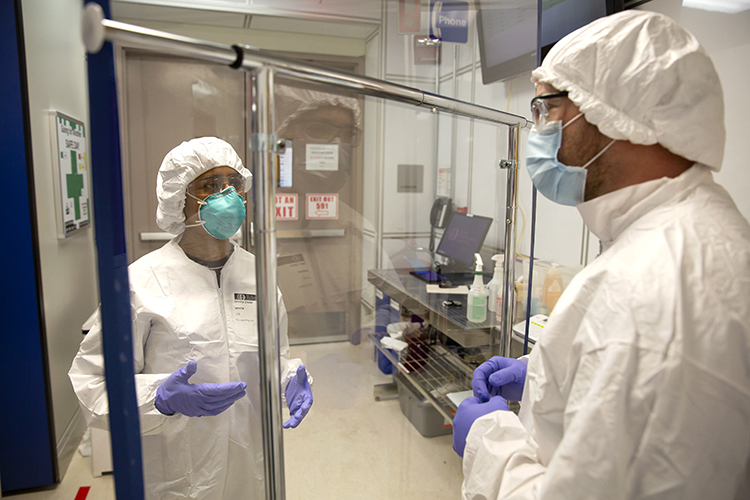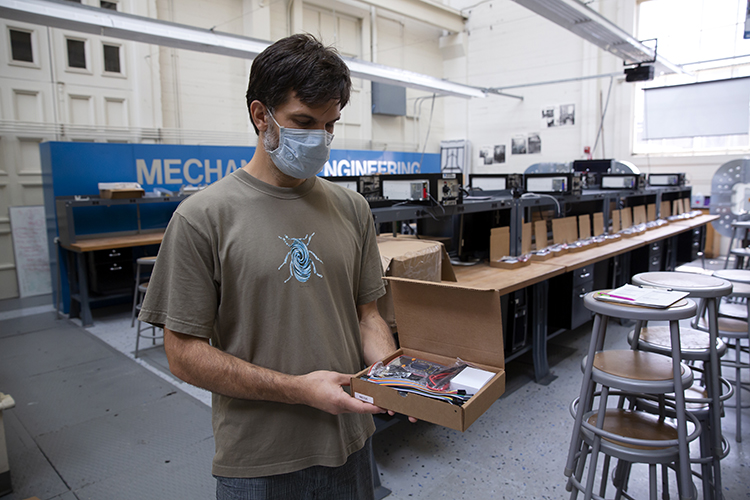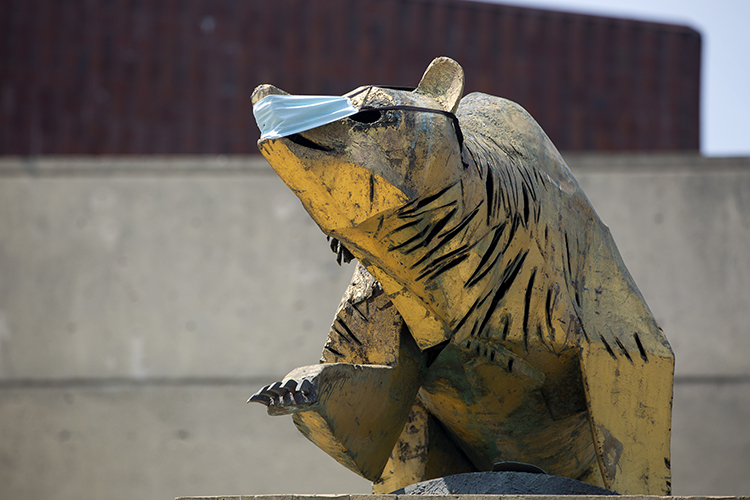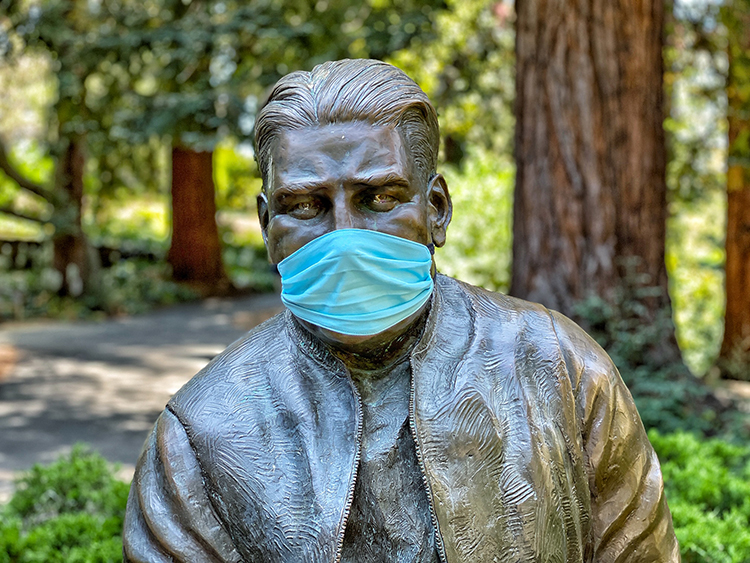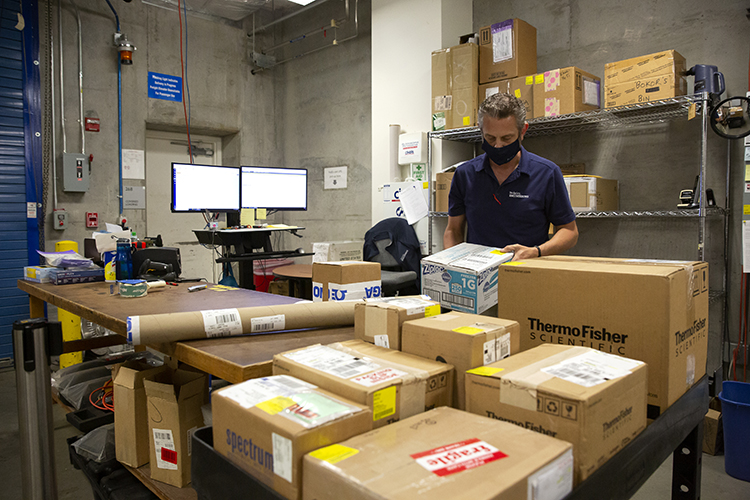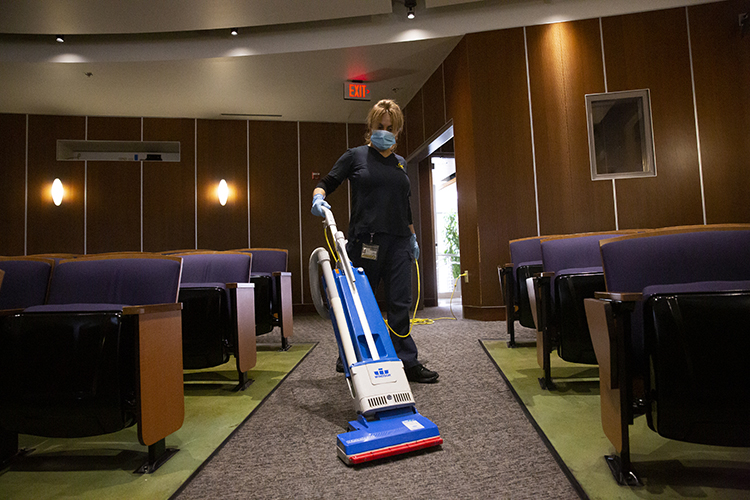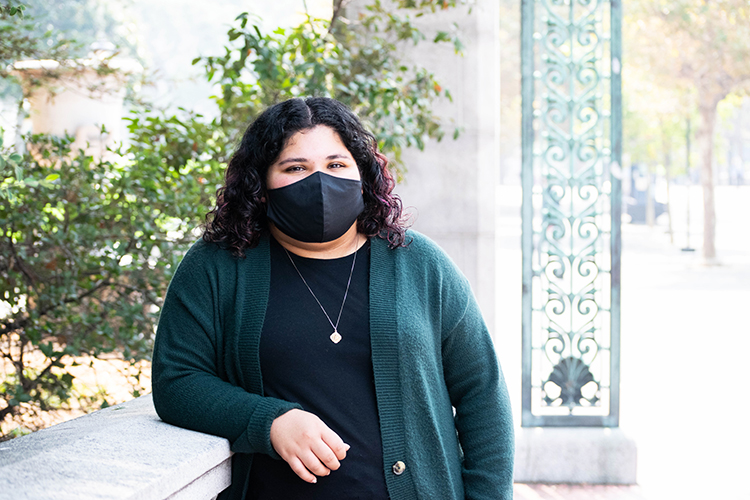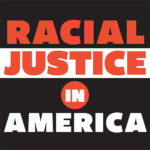Top UC Berkeley stories of 2020: The year in images, video and audio
For UC Berkeley, 2020 was a year of celebrating extraordinary achievements and rising to unprecedented challenges

December 21, 2020

For UC Berkeley, 2020 was a year of celebrating extraordinary achievements and rising to unprecedented challenges.
The campus won two Nobel Prizes — one in chemistry that went to professor Jennifer Doudna for the co-development of the genome-editing breakthrough CRISPR-Cas9, and one in physics that went to Professor Emeritus Reinhard Genzel and UCLA professor Andrea Ghez for discovering a supermassive compact object at the center of our galaxy.
Names were removed from three campus buildings in response to growing awareness of the controversial legacies of the halls’ namesakes that clash with the campus’s mission and values. And the campus launched 150 Years of Women at Berkeley, a yearlong campaign that celebrated the women who have studied, worked and researched at the university since women were first admitted to the campus 150 years ago.
After the coronavirus pandemic forced Bay Area residents to shelter in place and the campus shifted to all-virtual instruction in March, Berkeley scientists popped up a state-of-the-art COVID-19 testing laboratory and graduate students began to mix nearly 500 gallons of hand sanitizer a week to distribute to those in need in the region. And when in-person spring commencement was canceled, a group of students built a virtual Berkeley campus using Minecraft called Blockeley University, where they held their virtual commencement.
When faculty weren’t finding new ways to teach their students from afar, they were making discoveries and weighing in on some of today’s most pressing issues, from police brutality to the election in November.
Here’s a look back at Berkeley’s top stories of the year — in photos, video and audio.
JANUARY

UC Berkeley’s women’s basketball team in 1904 (Photo courtesy of the 150 Years of Women at Berkeley history project)
‘On equal terms’: UC Berkeley celebrates 150 years since women were first admitted
On Oct. 3, 1870, just two years after the University of California was founded, the UC Board of Regents unanimously approved a resolution proposed by Regent Samuel F. Butterworth to open the university’s doors in Berkeley to women, and “on equal terms” with men. This year, beginning in January, the campus commemorated the 150th anniversary of that resolution and recognized the countless women who have studied, worked and researched at UC Berkeley since then.
The celebration, 150 Years of Women at Berkeley, or 150W, featured a yearlong series of events and activities that compiled and presented an archive of historical information covering the last 150 years of women at the university.

UC Berkeley carpenter Joe Poppi removes the letters that spell “Boalt Hall” from the side of the Berkeley Law building early on Thursday, Jan. 30, 2020. (UC Berkeley photo by Roxanne Makasdjian)
UC Berkeley removes racist John Boalt’s name from law school
In January, UC Berkeley’s Boalt Hall removed its name from the law school. The denaming — the outcome of a nearly three-year process launched after a Berkeley lecturer discovered the racist writings of John Henry Boalt, a 19th-century Oakland attorney — was the first time a Berkeley facility’s name has been eliminated due to its namesake’s character or actions.
Also, read Chancellor Carol Christ’s message on why the campus chose to dename Boalt Hall and why one undergraduate student thinks that removing the hall’s name will help the campus climate.
New helmet design can deal with sports’ twists and turns
Robert Knight, a UC Berkeley professor of psychology and neuroscience, discusses in a January story a helmet he invented — one with more effective padding to dampen the effects of a direct hit, but more importantly, an innovative outer shell that rotates to absorb twisting forces that today’s helmets don’t protect against.
His design is flexible enough to provide protection for football and hockey players — who receive the most severe and most frequent blows to the head — as well as police, soldiers, snowboarders and anyone who wears a helmet or hard hat. And, yes, cyclists, too.
FEBRUARY
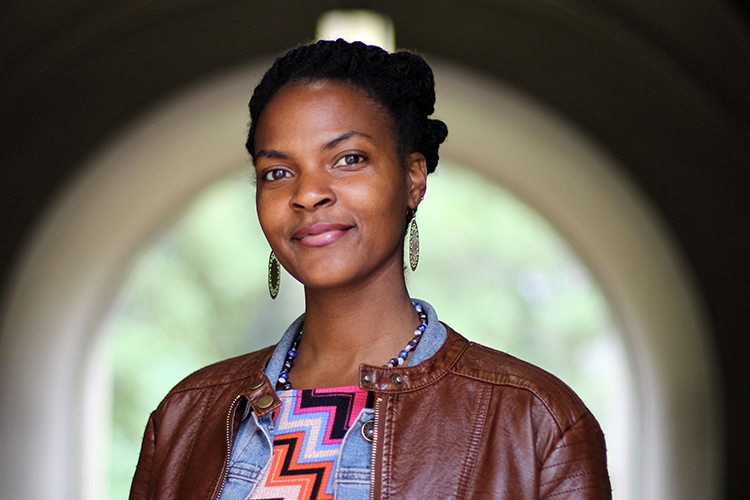
Takiyah Franklin is the faculty research coordinator at UC Berkeley’s Othering and Belonging Institute and served as chair of the Black Staff and Faculty Organization. (Photo courtesy of the Othering and Belonging Institute)
Takiyah Franklin on striving to live a liberated life, leading with love
“It’s February, and it’s Black History Month,” said Takiyah Franklin, a faculty research coordinator at UC Berkeley’s Othering and Belonging Institute. “But I recognize Black history every day. Black history is American history. And until we really start to understand that, I don’t know how much progress we’re going to make.
“We all have a choice. The choice that I have made is to hold a vibration of love, and it’s a choice that offers endless learning opportunities. I’m not talking about love in a romantic sense, but rather a practice that invites the exercise of the golden rule: ‘Do unto others as you would have them do unto you.’ That’s the choice that I’m making.”

President Donald Trump was acquitted of impeachment charges on Feb. 5, 2020. (Photo by Gage Skidmore via Wikimedia Commons)
What ancient Rome, the Founding Fathers and MLK can tell us about impeachment
A panel of top UC Berkeley scholars reacted to the Feb. 5 acquittal of President Donald Trump by the U.S. Senate in the impeachment trial. Some predicted a damaging erosion in the power of Congress to hold future presidents accountable for corrupt or criminal behavior. One warned of an assault on language so severe that it would undermine our sense of shared values and meaning; another said advocates of democracy must bring urgency and inspiration to their stories or risk further political losses.
And one described how members of the ancient Roman Senate rendered harsh judgment on emperors who violated the values and trust expected of them in their exalted office.

The Australian black flying fox (Pteropus alecto) is a reservoir for Hendra virus. (Photo courtesy of Linfa Wang)
Coronavirus outbreak raises question: Why are bat viruses so deadly?
It’s no coincidence that some of the worst viral disease outbreaks in recent years — SARS, MERS, Ebola, Marburg and, likely, SARS-CoV-2, the virus that causes COVID-19 — originated in bats.
A UC Berkeley study published in February found that bats’ fierce immune response to viruses could drive viruses to replicate faster, so that when they jump to mammals with average immune systems, such as humans, the viruses wreak deadly havoc.
UC Berkeley launches landmark $6 billion fundraising campaign
In February, UC Berkeley publicly launched Light the Way: The Campaign for Berkeley, the largest fundraising campaign in its history, to raise $6 billion by the end of 2023. The ambitious goal — the highest set by any U.S. public university without a medical school — aimed to secure Berkeley’s status as the world’s top public research and teaching university at a time when the state funds about 14% of its budget. The campaign was one of the largest taken up by any university, public or private, in the nation.
MARCH

Andy Lin interacts with GSI colleagues as he prepares for virtual office hours. (UC Berkeley screenshot by Andy Lin)
Coronavirus forces hands-on learning to go online and hands-off
On March 13, UC Berkeley canceled all in-person classes, throwing a wrench into the interactive training critical in many fields. How do you teach dance or theater, how to craft a vase on a potter’s wheel, run a gel, titrate an acid or use a micropipette without in-class practice and coaching?
Within science departments on campus, graduate students leaped into the breach. With only a few days’ advance warning that labs would be moved online, most of the nearly 110 graduate student instructors in the Department of Chemistry labored in shifts to photograph and videotape experiments for nine separate lab courses, ranging from introductory chemistry to advanced synthesis.
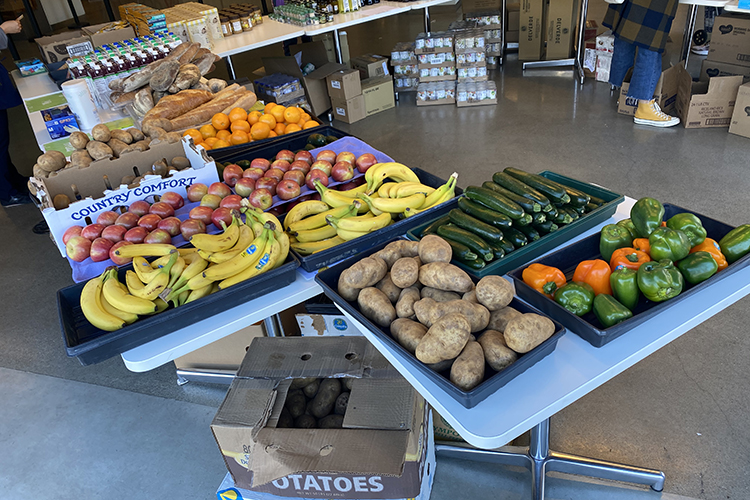
UC Berkeley’s Basic Needs Center provided an array of food in its first on-campus “food pop-up,” following the move to remote instruction in mid-March. (Photo courtesy of Kiyoko Thomas)
Basic Needs Center helps students struggling during shelter-in-place
UC Berkeley’s Basic Needs Center saw a surge in need as statewide shelter-in-place orders left some students without work and sufficient housing. In just two weeks in March, nearly 1,000 students made use of the food pantry, including the center’s on-campus food distributions, known as “food pop-ups.”
“You can’t assume that people have shelter and have food to take care of themselves when they’re sheltering in place,” said Ruben Canedo, chair of Berkeley’s Basic Needs Committee. “We didn’t want our students with those limitations to put themselves in a place of danger, to put themselves in a place of harm.”
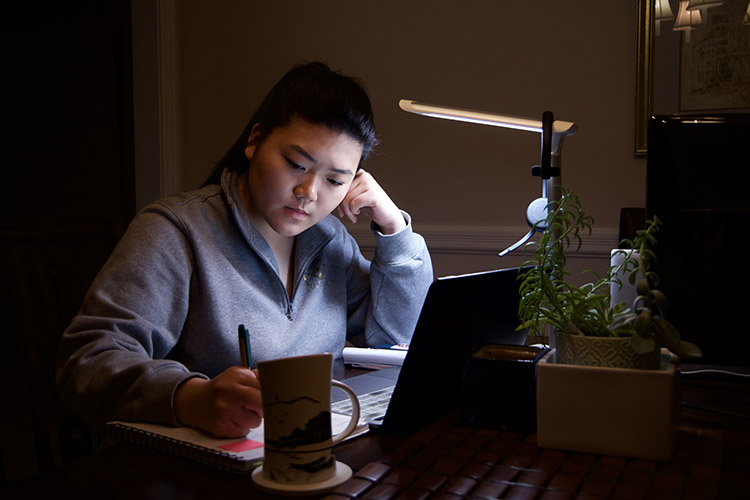
“We’ve been through a lot together,” said Paulina Jeng, UC Berkeley’s Senior Class Council president, of the Class of 2020. (Photo by Andrew Jeng)
Commencement curveball: Graduating students jolted by COVID-19
At the end of March, graduating UC Berkeley students learned that 2020 Spring Commencement would be either virtual or postponed. “This is an uncertain time: Will we have a graduation, or not? Will I see my friends again?” said senior Patrica “Betty” Besada, an art practice major. “All I know is that this is happening to guarantee our health, which is more valuable than anything.”

Postdoctoral fellows Jenny Hamilton and Enrique Lin Shiao stand by an automated liquid-handling robot (Hamilton STARlet) that will be used to analyze swabs from patients to diagnose COVID-19. Hamilton and Shiao volunteered to train to become CLIA certified so as to process patient samples. When analyzing real samples from patients, they will be wearing full personal protective equipment (PPE), including mask, face shield, gown and gloves. (Photo courtesy of Max & Jules Photography)
UC Berkeley scientists spin up a robotic COVID-19 testing lab
As doctors around the country scrambled to diagnose cases of COVID-19, scientists at UC Berkeley’s Innovative Genomics Institute (IGI) in March created from scratch a diagnostic lab with the capability to process more than 1,000 patient samples per day.
This pop-up laboratory, the effort of a unique volunteer team of academic and corporate partners, provided desperately needed testing capacity in the Bay Area for those with COVID-19 symptoms and also helped public health officials assess how widespread the epidemic was.
Find the latest COVID-19 campus news.
APRIL
‘Liquid gold’: UC Berkeley lab makes free hand sanitizer for those in need
Since the first day of the statewide shelter-in-place mandate in mid-March, UC Berkeley graduate student Abrar Abidi and his Berkeley colleague Yvonne Hao worked day and night to mix nearly 500 gallons of sanitizer a week, using a student teaching lab in Berkeley’s Li Ka Shing Center for Biomedical and Health Sciences, a loyal cadre of lab mates and ingredients that are standard supplies in many biology labs.
They and a couple of dozen volunteers then distributed the free sanitizer — in small bottles, as well as gallon jugs — to homeless shelters, senior centers, hospices, health centers, jails and other places in the East Bay and San Francisco that were experiencing shortages of sanitizer or that served populations whose safety has been largely ignored as the COVID-19 pandemic ripped through the state.
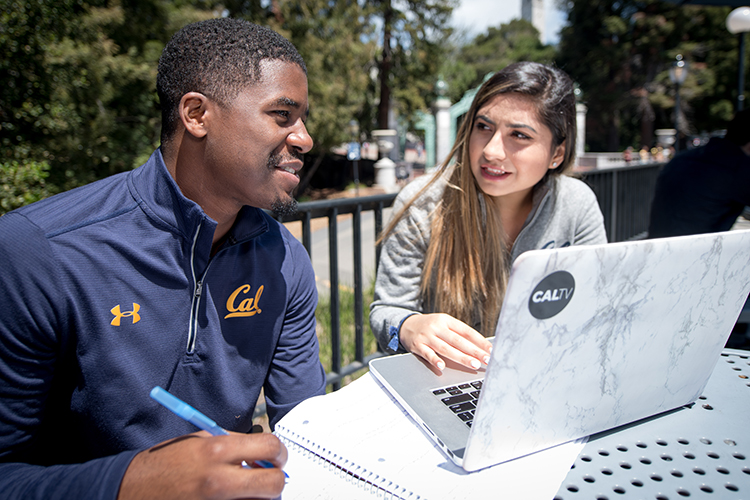
UC Berkeley’s prospective students tuned in to their laptops and iPads this year for Cal Week, an all-virtual experience that replaced the normal on-campus spring event, Cal Day. (UC Berkeley photo by Keegan Houser)
Virtual ‘Cal Week’ replaces Cal Day during shelter-in-place
Instead of opening its doors for a single day in April for its annual open house, Cal Day, UC Berkeley instead offered more than 100 digital events during the newly named “Cal Week.” The weeklong event featured online live and pre-recorded video streams to give the more than 15,000 newly admitted first-year and transfer students a virtual space to learn about the richness of Berkeley’s academic and student life from current students, faculty and staff.
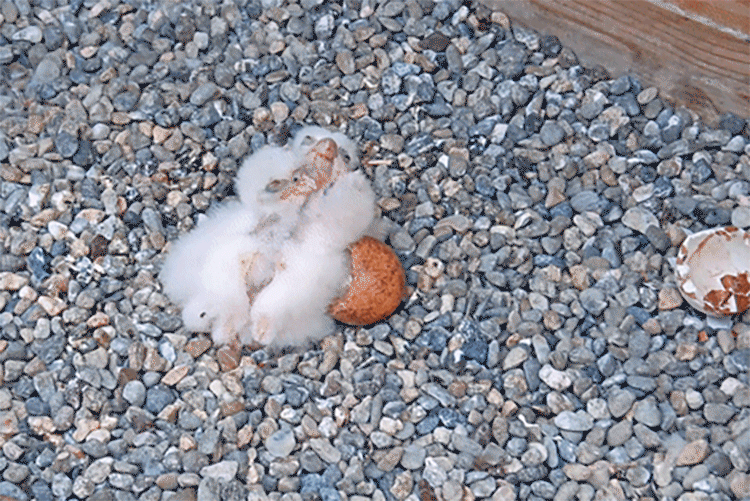
In late April, three peregrine falcon chicks hatched in their nest box on the Campanile. They were later named Poppy, Sequoia and Redwood by the campus community. (Cal Falcons gif)
Triplets in the tower: Berkeley’s falcon family grows
Three peregrine falcon chicks hatched atop UC Berkeley’s Campanile in April — the fourth family to call the 307-foot bell tower their home. This year, there had been four eggs, but one broke and was non-viable. “Even two chicks is a successful nest for a peregrine falcon,” said Sean Peterson, a Berkeley Ph.D. candidate who, with his wife, biologist Lynn Schofield, runs the successful Cal Falcons social media project. The couple, who celebrated the births by baking a batch of cookies, hosted a one-hour Hatch Day Q&A on YouTube for an audience of about 500 people.
A few weeks later, the baby falcons were named Poppy, Sequoia and Redwood by the campus community during the annual naming contest. At about six weeks old, the three fledglings took their first flight.
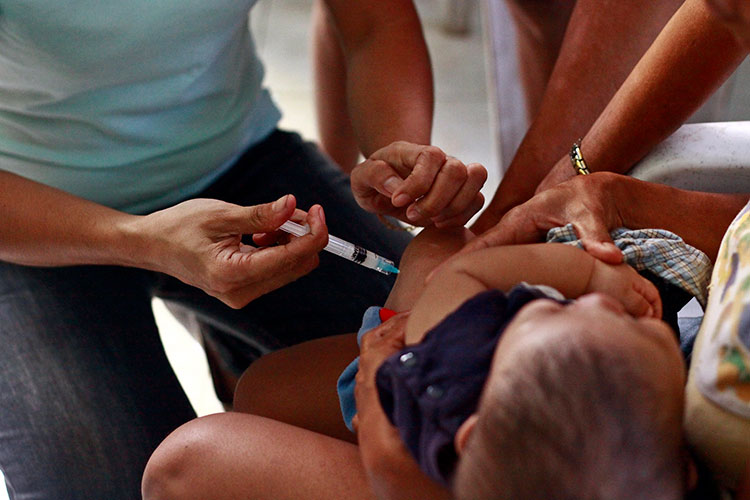
Childhood immunization with two common vaccines prevents tens of millions of episodes of antibiotic-treated illness each year, an April study led by UC Berkeley researchers found. (World Bank photo by Kenneth Pornillos via Flickr)
To prevent antimicrobial resistance, vaccinate the world’s kids
Around the world, overuse of antibiotics is driving the proliferation of bacterial “superbugs” that have evolved to survive antimicrobial exposure, making humans more vulnerable to diseases like sepsis, tuberculosis, malaria and pneumonia. An April study led by researchers at UC Berkeley found that immunization with two common vaccines — the pneumococcal conjugate and rotavirus vaccines — significantly reduces the rates of acute respiratory infections and diarrhea among small children in low- and middle-income countries, which bear the brunt of the human and economic impacts of antimicrobial resistance. And, with fewer children getting sick or severely sick, fewer are receiving antibiotic treatment.
MAY
Watch Blockeley, UC Berkeley’s online Minecraft commencement
After UC Berkeley’s in-person commencement ceremony was cancelled, a team of more than 100 Berkeley students and alumni created a virtual, mock ceremony in California Memorial Stadium, complete with “Pomp and Circumstance,” the chancellor, the conferring of degrees, “Hail to California” and flying mortarboards. It happened within Blockeley University, a fantastical recreation of the campus built using Minecraft, a video game many of them first played as tweens.
Also, read “You achieved greatness in the face of turmoil, virtual Carol Christ tells 2020 graduates.”

Anna Boser, a statistics major, was UC Berkeley’s top graduating senior this year. (UC Berkeley photo by Brittany Hosea-Small)
Rejection turned out great for Berkeley’s top graduating senior
“I really wanted to go to UCLA, but I got rejected,” said UC Berkeley senior Anna Boser, who grew up in the city of Berkeley. “I got rejected from Stanford. I got rejected from USC. I got rejected from pretty much everywhere,” says Boser. “Berkeley was by far the best college that I got into, and even though I wanted to get away from my hometown, Cal ended up being exactly the right fit for me.”
Boser, who majored in statistics and had a perfect 4.0 GPA, was this year’s winner of the University Medal, Berkeley’s highest honor for a graduating senior.
Also, meet the four finalists for the University Medal: Michael Cerda-Jara, Varsha Sarveshwar, Bhavish Dinakar and Isaac Witte.
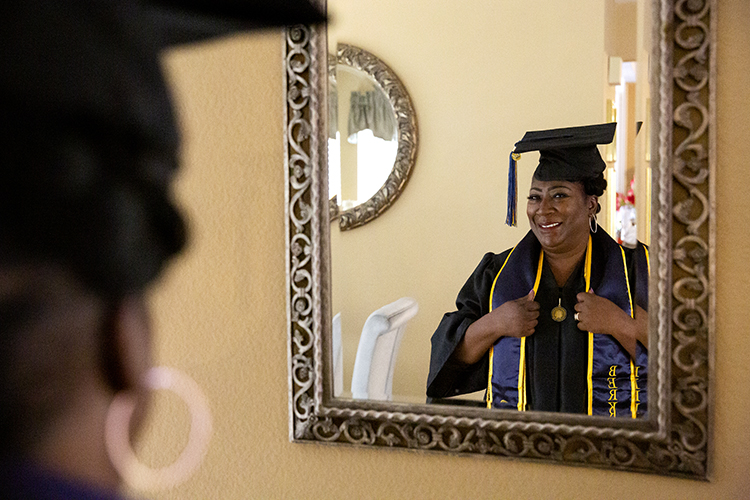
Ready for an in-person graduation ceremony in May, Jules Patrice Means was devastated when the coronavirus pandemic took away that opportunity. (UC Berkeley photo by Brittany Hosea-Small)
Look out, world. Graduating senior Ms. Jules, 67, is just getting started
UC Berkeley graduating senior Jules Patrice Means, who faced a lifetime of challenges — from having a baby in high school to suffering a major stroke at age 60 — said the hardships she faced made her stronger and better equipped “to do what the Bible tells us: To love your neighbor as much as you love yourself,” she said. “That’s how I live my life.”
Also, read “How student Aminah Elster liberated herself by giving voice to others,” in which the formerly incarcerated Berkeley student, who graduated in May with a B.A. in legal studies, discussed how, in prison, school was an escape and why she’s an advocate for the community that changed her life.
JUNE

In New York, protesters demonstrate against the the murder of George Floyd, who died while in police custody in Minneapolis on May 29. (AP photo by Mary Altaffer)
George Floyd’s death is a reminder that Black voices are still ignored
On May 29, the excruciating stretch of eight minutes when four Minneapolis police officers ignored George Floyd’s pleas for one of the officers to take his knee off Floyd’s neck was part of a long history of Black people’s urgent cries for help being ignored by America’s white power structure.
That’s according to Nikki Jones, a UC Berkeley professor of African American studies who, for 10 years, has worked with research partners to collect and analyze hundreds of video recordings of police encounters with the public.
“The resistance sparked by Floyd’s death that we see out in the streets today is not the only form of resistance that occurs,” Jones said. “Resistance happens every day.”
Also, read “Thoughts from your Black colleague” and “How reforms could target police racism and brutality — and build trust.”

“The faster people can see science happening, the faster they can make new discoveries, be more collaborative … and make more advancements,” said UC Berkeley University Librarian Jeff MacKie-Mason, of the benefits of open access publishing. (UC Berkeley Library photo by Jami Smith)
UC wins North America’s largest open access publishing agreement
In June, the University of California won the largest open access agreement in North America with Springer Nature, the world’s second-largest publisher of scholarly research. The four-year agreement by default publishes open access to all articles with a UC-corresponding author that appear in more than 2,700 Springer Nature journals and gives UC students, faculty and researchers access to more than 1,000 journals that UC did not subscribe to previously.
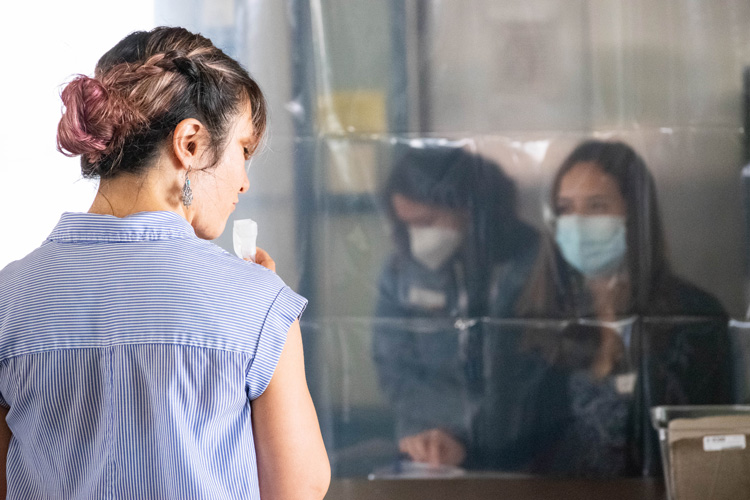
Jackie Childers, a graduate student in integrative biology at UC Berkeley, provides a saliva sample for a trial to assess whether testing for the SARS-CoV-2 virus in saliva is as reliable as testing samples obtained with nasal swabs. (UC Berkeley photo by Irene Yi)
UC Berkeley launches trial of saliva test for COVID-19
Scientists from the Innovative Genomics Institute (IGI), the same UC Berkeley group that rapidly popped up a state-of-the-art COVID-19 testing laboratory in March, trialed in June a quicker way to obtain patient samples: through saliva. Until then, diagnostic tests for COVID-19 relied on samples obtained by swabbing uncomfortably deep into a person’s nasal passages or in the mouth and nose, but those tests must be administered by trained medical staff wearing personal protective equipment (PPE). Saliva, collected in the same way companies like 23andMe and Ancestry.com get samples for DNA genealogy analysis, can be gathered without medical supervision, and that saves time, money and precious PPE.

Doe Library (UC Berkeley photo by Keegan Houser)
UC Berkeley No. 1 U.S. public, 12th best globally in World University Rankings
UC Berkeley ranked first among U.S. public universities and 12th in the world among both public and private universities, according to the Center for World University Rankings in June. For its 2020-2021 rankings, the center evaluated 20,000 universities worldwide based on research performance, quality of education, quality of faculty and alumni employment.

Older mice grew significantly more new muscle fibers, shown as pink doughnut-like shapes, after undergoing a procedure that effectively diluted the proteins in their blood plasma (bottom) than they did before they underwent the procedure (top). (Image courtesy of Irina Conboy)
Diluting blood plasma rejuvenates tissue, reverses aging in mice
A study published in June by a team of UC Berkeley researchers showed that age-reversing effects can be achieved by diluting the blood plasma of old mice. In the study, the team found that replacing half of the blood plasma of old mice with a mixture of saline and albumin — where the albumin simply replaces protein that was lost when the original blood plasma was removed — has the same or stronger rejuvenation effects on the brain, liver and muscle than pairing with young mice or young blood exchange. Performing the same procedure on young mice had no detrimental effects on their health.
JULY
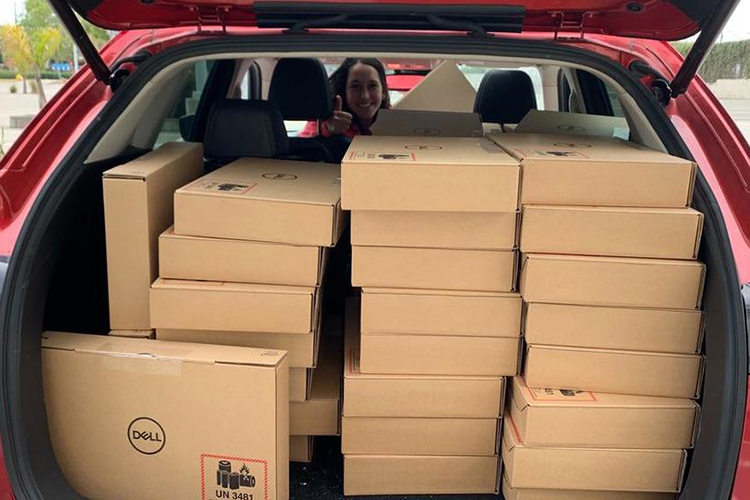
Hundreds of laptops were sent to eligible UC Berkeley students through the campus’s new Student Technology Equity Program (STEP). (Photo by Glenn Cruz)
Campus, going remote, provides $4.6 million in tech to students in need
With the fall 2020 semester beginning remotely, a new UC Berkeley program provided an extraordinary $4.6 million in support for students who attend class, do assignments and take tests from home — but who lack reliable laptops, Wi-Fi and other technology. Some 3,300 laptops and 800 Wi-Fi hot spots were among the loaner equipment sent to applicants who meet the requirements of the new Student Technology Equity Program (STEP).

Michael V. Drake was announced in July as the University of California’s new incoming president, the UC system’s first Black leader in its 152-year history. (Photo courtesy of Ohio State University)
Michael V. Drake selected as first Black president of UC system
In July, the UC Board of Regents announced the appointment of Dr. Michael V. Drake as the new UC president. The former president of The Ohio State University, Drake, 69, has vast experience addressing access and equity and is the UC’s first Black president in its 152-year history and the 21st president of the 10-campus system.
AUGUST
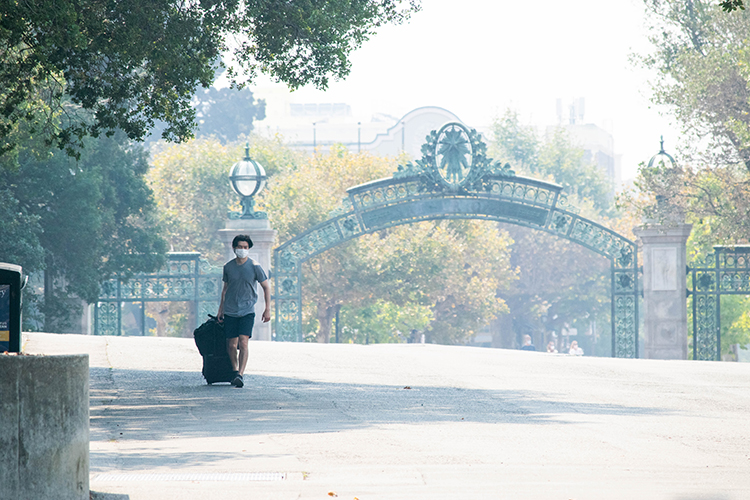
In a mask protecting himself not only from COVID-19, but from smoke caused by California’s raging wildfires, a student wheels his belongings through the UC Berkeley campus in August. (UC Berkeley photo by Irene Yi)
Fall 2020 at UC Berkeley: Masks, remote learning and courage
All-remote instruction at UC Berkeley, aided by $10 million in resources, began in August. Adhering to COVID-19 safety mandates, research continued, as did student public service efforts, student-athlete workouts, faculty office hours, health care appointments, Cal Band practices and campus construction projects. From the library to the stadium to the Basic Needs Center to student housing, campus institutions and programs found creative workarounds to business as usual.
Also, read “Graduate student president: ‘You belong here and this institution needs you,'” “Berkeley’s undergraduate student leader: Stay resilient” and “Berkeley admits most ethnically diverse class in over 30 years.”
Closed, open, still, stirring: Pandemic-era Berkeley in 30 photos

Aedes aegypti mosquitoes carry many viral diseases, including dengue, Zika and yellow fever.
Breakthrough in eliminating dengue, other mosquito-borne diseases
A 27-month trial in Indonesia of a unique method of mosquito control shows that the strategy can reduce the incidence of dengue — a mosquito-borne viral disease of the tropics that threatens nearly half the world’s population — by 77%.
The method, which employs Aedes aegypti mosquitoes infected by bacteria called Wolbachia, effectively prevents dengue-infected mosquitoes from passing on the virus when they bite people. The study, the preliminary results of which were released in August, looked only at dengue, but the mosquito control strategy may likely work for other viruses carried by A. aegypti mosquitoes, including Zika, chikungunya and yellow fever.
“It is a huge breakthrough,” said Nicholas Jewell, a Professor of the Graduate School at UC Berkeley, who designed the study and led the statistical analysis.
SEPTEMBER
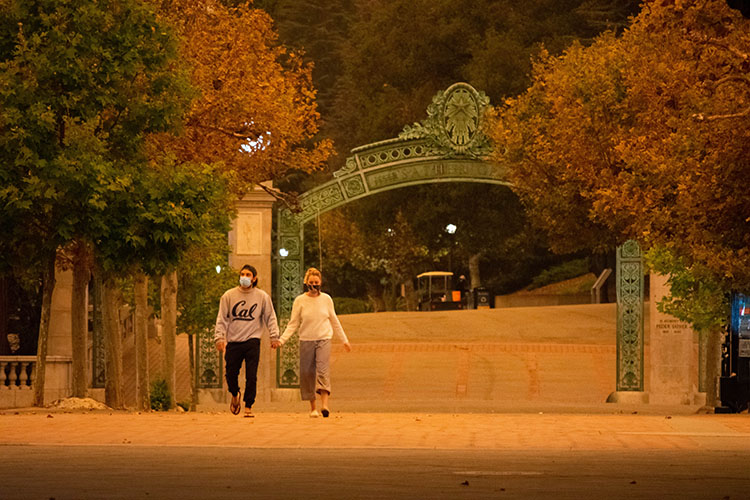
A couple walks across UC Berkeley’s Sproul Plaza in September. The Bay Area was filled with thick smoke from wildfires, and a marine layer blanket on top blocked the sunlight. (UC Berkeley photo by Irene Yi)
Dark, orangey skies over campus: Let there be light, please?
An atypical remote start to the new fall semester in August got even more unnatural when heavy smoke from Northern California’s wildfires, sitting atop a heavy marine layer in the Bay Area, produced dark and eerie orange skies.
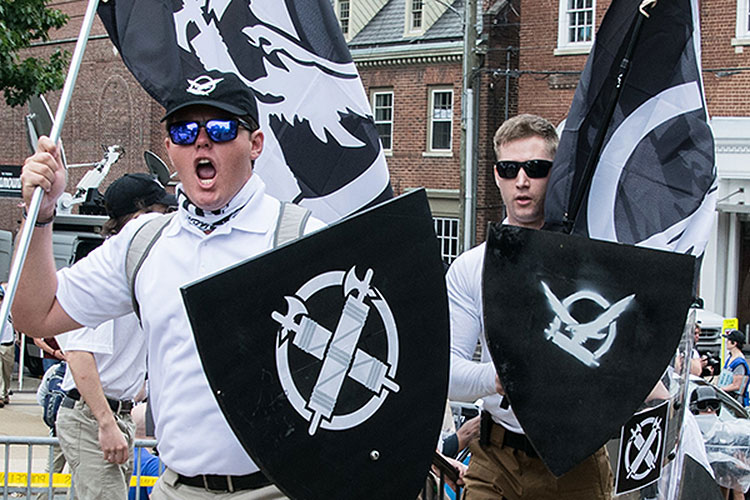
As the U.S. becomes more diverse, some white voters feel a rising resentment that they could lose power and privileges long taken for granted. That anger finds form in the growing white nationalist movement, says Lawrence Rosenthal, founder of the Center for Right Wing Studies at UC Berkeley. (Photo by Rodney Dunning via Flickr)
Resentment: the emotion that has set fire to U.S. democracy
Throughout his presidency, Donald Trump seemed to defy the laws of political gravity: Despite myriad scandals, open racial incitement, admiration of dictators, the indictment or imprisonment of his high-level staff, his own impeachment and a widely criticized response to the COVID-19 pandemic, his support among voters held steady, just north of 40%.
The question is: Why?
In a new book, UC Berkeley scholar Lawrence Rosenthal bore beneath the headlines and tweetstorms to the realm of human emotion and concludes that, to understand this moment in American politics, it is essential to understand one of the most primal emotions of all: resentment.
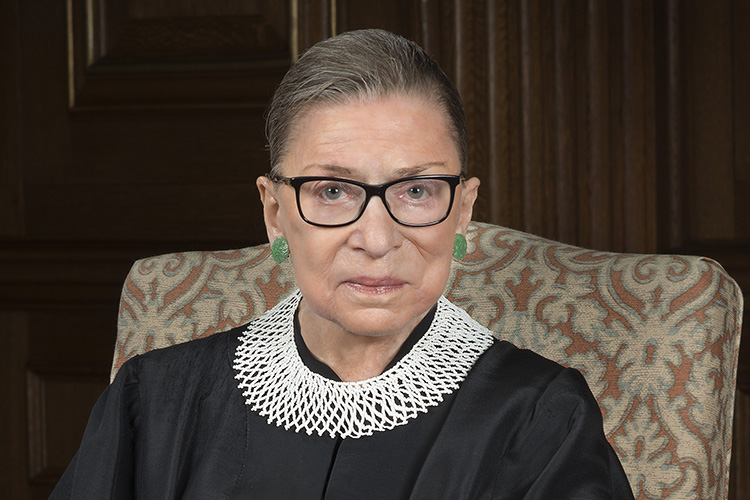
Supreme Court Justice Ruth Bader Ginsburg (Photo courtesy of the Supreme Court of the United States)
UC Berkeley community mourns death of Ruth Bader Ginsburg
The death in September of Justice Ruth Bader Ginsburg, the second woman appointed to the U.S. Supreme Court and a pioneering advocate for women’s rights, prompted heartfelt reaction at UC Berkeley, where Ginsburg gave a lecture at a packed Zellerbach Hall just last fall.
The Supreme Court announced her death, which occurred at her home in Washington, D.C., where she was surrounded by family; the cause was complications from metastatic cancer of the pancreas. Chief Justice John Roberts praised her as “a justice of historic stature.” She was 87.

Demonstrators protest violence against women on the International Day for the Elimination of Violence against Women in Mexico City, Mexico, on Nov. 25, 2019. (Sipa USA photo by Bénédicte Desrus via AP Images)
Objects of resistance: Protesting the feminicide of girls and women at the border
In a story for National Hispanic Heritage Month, Laila Espinoza, a graduate student in the performance studies program at UC Berkeley, explored how magenta crosses and murals found in Ciudad Juárez in Chihuahua, Mexico, are powerful and enduring symbols of resistance — a way that mothers and families reclaim public space in the border city and make the ongoing murder of women and girls visible, when the government refuses to do so.

A protestor at a march for racial justice in Atlanta, Georgia, holds a sign of Breonna Taylor, a 26-year-old Black woman who was killed by Louisville police on March 13, 2020, during a botched drug raid. (Photo by Maria Oswalt via Unsplash)
In Breonna Taylor grand jury decision, Berkeley scholars see grave racial injustice
In a season of strife over police violence against people of color, a Kentucky grand jury decision in September against charging officers with the killing of Breonna Taylor reflected devastating racial biases in the American system of justice, UC Berkeley scholars said.
The grand jury’s decision may have correctly followed current law on police use of deadly force, said experts in policing and law. But they predicted that the killing of an unarmed Black woman, who was not a criminal suspect, would deepen the crisis of racial injustice that has gripped the nation this year following high-profile incidents of police brutality.
Also, listen to an interview with Savala Trepczynski, the director of the social justice center at Berkeley, about the elusive nature of racial justice and how Taylor’s killing reminded her of a murder that happened in her own family — to her great-great-grandmother.
These stories are part of Racial Justice in America, an ongoing series by Berkeley’s Office of Communications and Public Affairs, that seeks to make sense of American racism. Stories probe some of the world’s best minds in fields of study, including social welfare, public health, education, history, education, history and law. See all the stories in the Racial Justice in America series.

A September study forecasted the onset of Alzheimer’s disease based on people’s sleep patterns. (iStock photo)
How we sleep today may forecast when Alzheimer’s disease begins
What would you do if you knew how long you had until Alzheimer’s disease set in? Don’t despair. New UC Berkeley research published in September suggests one defense against this virulent form of dementia — for which no treatment currently exists — is deep, restorative sleep, and plenty of it.
OCTOBER

UC Berkeley’s Reinhard Genzel, an emeritus physics professor, talks on the phone on Oct. 6 from his office in Germany, just after learning he had won the Nobel Prize in Physics for discovering a supermassive compact object at the center of our galaxy. (Photo by Stefan Gillessen via the Nobel Committee)
UC Berkeley’s Reinhard Genzel awarded Nobel Prize in Physics
On Oct. 6, Reinhard Genzel, a professor emeritus of physics and of astronomy at UC Berkeley, and director of the Max Planck Institute for Extraterrestrial Physics in Garching, Germany, shared half the 2020 Nobel Prize in Physics with UCLA professor Andrea Ghez “for the discovery of a supermassive compact object at the center of our galaxy.”
The other half of the prize went to United Kingdom theoretical physicist Roger Penrose “for the discovery that black hole formation is a robust prediction of the general theory of relativity.”
Also, read about how UC Berkeley played big role in Reinhard Genzel’s Nobel Prize-winning work.
UC Berkeley’s Jennifer Doudna wins 2020 Nobel Prize in Chemistry
On Oct. 7, UC Berkeley biochemist Jennifer Doudna won the 2020 Nobel Prize in Chemistry, sharing it with colleague Emmanuelle Charpentier for the co-development of CRISPR-Cas9, a genome editing breakthrough that has revolutionized biomedicine.
CRISPR-Cas9 allows scientists to rewrite DNA — the code of life — in any organism, including human cells, with unprecedented efficiency and precision. The groundbreaking power and versatility of CRISPR-Cas9 has opened up new and wide-ranging possibilities across biology, agriculture and medicine, including the treatment of thousands of intractable diseases.
Also, read “UC Berkeley campus reacts to two Nobel Prize wins in one week” and “First Day in a Nobel Life: Jennifer Doudna.”

According to MacArthur Award winner Polina Lishko, nearly 40% of women stop using birth control pills within a year, underscoring the importance of developing non-hormonal contraceptives. (UC Berkeley photo by Mark Joseph Hanson)
Contraceptive researcher Polina Lishko receives MacArthur “genius” award
Polina Lishko, a Ukrainian-born physiologist whose work at UC Berkeley has already led to the development of promising new non-hormonal contraceptives for women and could lead to male or unisex contraceptives, was chosen to receive a 2020 MacArthur “genius” Award in October.

(Photo from the Disabled Students’ Program photograph collection, UARC PIC 28H:001, The Bancroft Library, University of California, Berkeley)
Campus archives reveal genesis of U.S. disability rights movement
For National Disability Employment Awareness Month in October, a story highlighted the Bancroft Library’s Disability Rights and Independent Living Movement archives, a rich collection of personal papers, records from Bay Area disability organizations and transcribed oral histories of leaders, participants and observers of the movement that gained momentum alongside the civil rights and women’s movements in the 1960s and 1970s.
The archives, like all social movements in history, didn’t just happen — they took immense dedication and perseverance by activists on the campus to make them a reality.
Also, read “Student Alena Morales on the fight for campus’s new disability cultural center” and “Sydney Ji on the intersection of disability, culture and gender.”

UC Berkeley campus (UC Berkeley photo)
UC Berkeley still No.1 public, fourth best globally in U.S. News rankings
In October, UC Berkeley remained the world’s top public and fourth best university overall in the latest global rankings by U.S. News & World Report. As it did last year, Berkeley came in fourth among public and private universities, preceded by Harvard, MIT and Stanford, with the UK’s University of Oxford rounding out the top five.
NOVEMBER
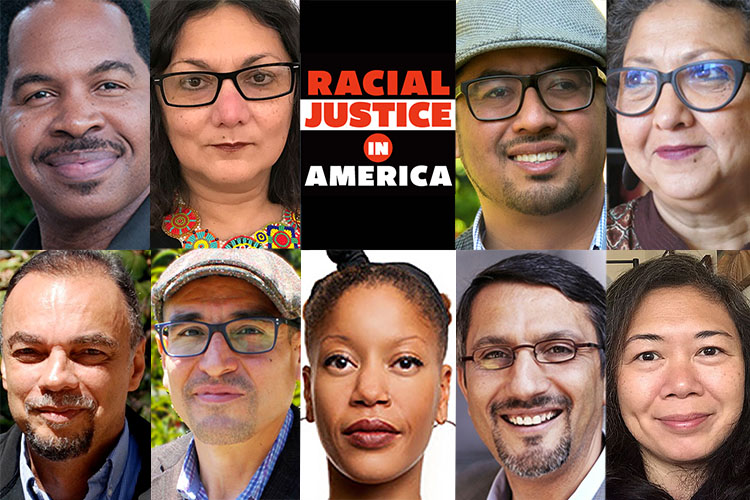
On the eve of a historical presidential election, leaders from UC Berkeley’s communities of color offered a mosaic of personal reflections that explored the political and human stakes of the extraordinary time. (UC Berkeley photos)
Election 2020: A referendum on racial justice in America
In the final days of the presidential campaign, near the end of this profoundly difficult year, Berkeley News conducted interviews with faculty and staff from UC Berkeley’s communities of color — whose influence extends from campus classrooms across the nation and around the world.
Each was working to understand the moment in history, embodied by the contest between President Donald Trump and Democratic challenger Joe Biden. Each felt deep frustration, worry and often anger, but also stubborn hope that some essential lesson — and some on-the-ground progress — could come from it. Each provides leadership in their communities, while drawing inspiration from students and other young people coming of age in a time of trial.
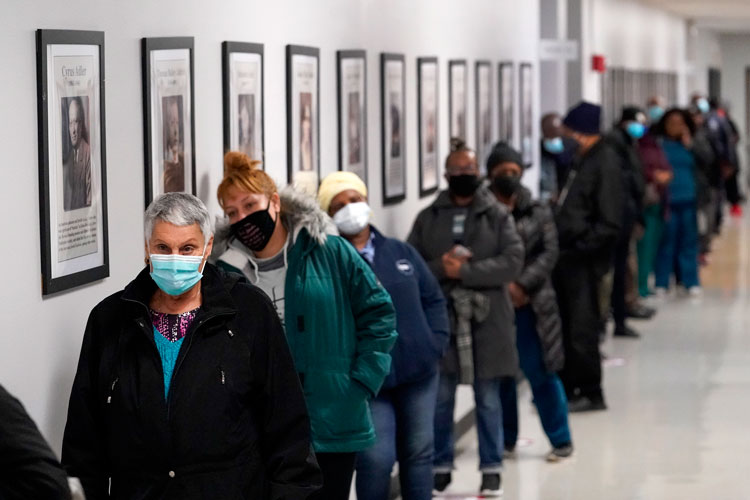
People from the Bronx borough of New York line up on Nov. 3 to vote. (AP Photo by Mark Lennihan)
America on edge: Berkeley scholars’ early election thoughts
UC Berkeley scholars awoke on Wednesday, Nov. 4, to signs of a deeply divided U.S. electorate and no blue wave on the horizon. Despite a surge in early voting, ballots were still being counted in several battleground states. As of noon that day, the race between President Donald Trump and his Democratic challenger Joe Biden remained too close to call.
Berkeley experts across various academic disciplines offered perspectives on where we as a country found ourselves in the days after the election. They also gave their thoughts about the role, good and bad, of such wedge issues as immigration, racial justice, law and order, the environment and the handling of the coronavirus pandemic, in the historic presidential vote.
Also, read “Berkeley students reflect on the election and the work ahead” and “As the nation waits, old divisions linger — and deepen.”

Kamala Harris, the vice president-elect, speaks in Wilmington, Delaware, on Nov. 7. (AP Photo by Andrew Harnik)
Kamala Harris’s rise, multicultural roots and challenges
What more could symbolize the American dream than the ascension of Kamala Harris? Born and raised in Oakland and Berkeley in the 1960s and ’70s, and as the daughter of Jamaican and South Indian immigrants, Harris checks multiple diversity boxes. After cutting her teeth as a Bay Area prosecutor in Alameda and San Francisco counties, Harris shot to political fame as the first woman of color to be elected San Francisco district attorney, and then state attorney general. In 2016, she became the second Black woman elected to the U.S. Senate.
UC Berkeley faculty, students and staff celebrated Harris’s extraordinary political career and reflected on whether her biracial, multicultural roots helped, or hindered, her path to the vice presidency.
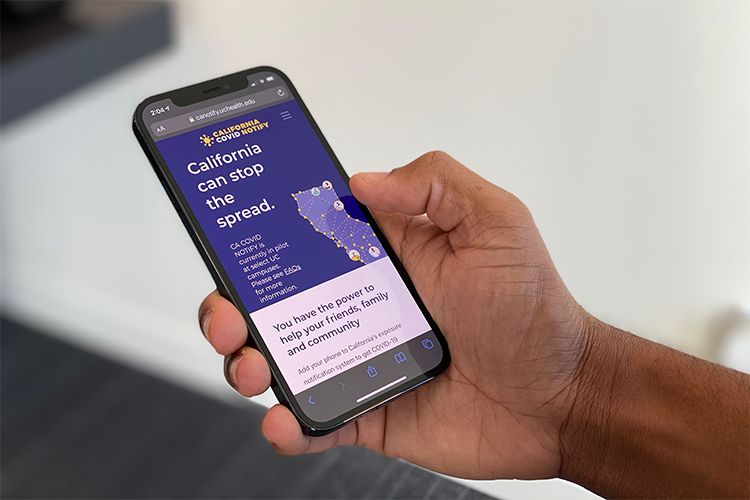
California COVID Notify sends users alerts to their smartphones when they’ve been exposed to COVID-19. (UC Berkeley photo by Patrick Holmes)
Opt-in to California exposure app to slow the spread of COVID-19
In November, UC Berkeley joined a pilot program, California COVID Notify, a privacy-first approach to using smartphones to alert you when you’ve been exposed to COVID-19. The app augments traditional contact tracing efforts and makes it possible to reach unknown contacts.

In November, UC Berkeley work crews removed or covered lettering on LeConte Hall and Barrows Hall following a campus announcement that the academic buildings had been unnamed. (UC Berkeley photo by Irene Yi)
UC Berkeley’s LeConte and Barrows halls lose their names
The names of UC Berkeley’s LeConte Hall and Barrows Hall were removed in November. The decision, capping a formal review process, was made in response to growing awareness of the controversial legacies of the halls’ namesakes — all of them early, prominent members of the UC faculty — that clash with the campus’s mission and values.
Also, read “Chancellor Christ on the unnaming of LeConte and Barrows halls,” “Family reckoning: 25 descendants of David Barrows support hall’s unnaming” and “Natividad: The names they gave us cut deep.”
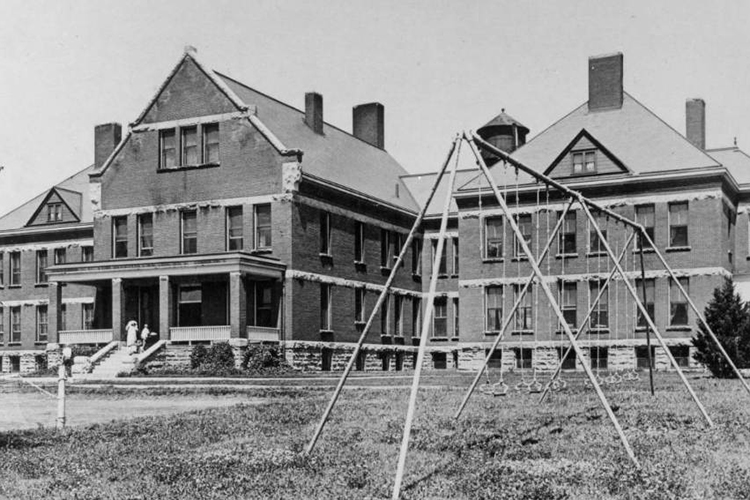
The Hiawatha Insane Asylum for Indians (pictured), which opened for business in 1903, was the first and only federally funded psychiatric institution for American Indians in the U.S. (Photo from the South Dakota State Historical Society, South Dakota Digital Archives, 2009-07-02-012)
How the U.S. government created an ‘insane asylum’ to imprison Native Americans
A November Fiat Vox podcast episode told the story of the Hiawatha Insane Asylum for Indians — a place where Native people from across the country were forcibly committed and imprisoned, often for reasons that had nothing to do with having a mental illness. From 1903 to 1933, when it closed after a short, but brutal, existence, more than 350 Native people had been held, and at least 121 people had died, in the facility.
This is the first part of a two-part series for National Native American Heritage Month about how disability was used and continues to be used as a way to control and profit from Native populations. Listen to the second episode: “How state courts use disability to remove Native children from their homes.”
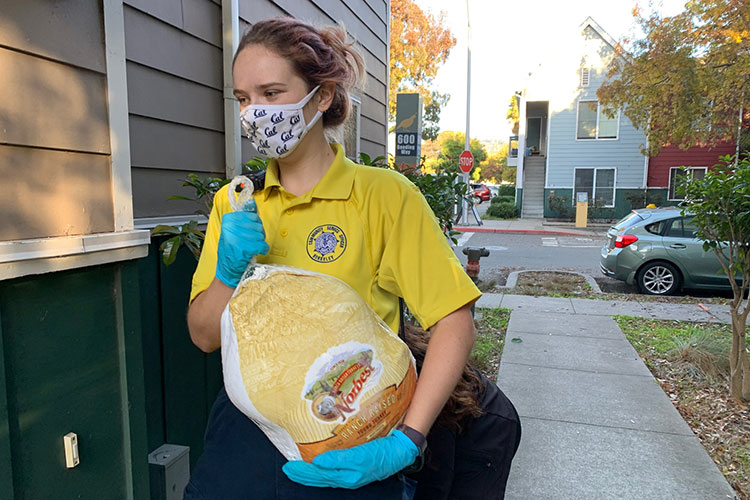
For the seventh year in a row, the UC Berkeley Police Department delivered frozen turkeys, boxes of produce and gift cards ahead of the holidays to University Village families. (Photo courtesy of UCPD)
Annual turkey drive brings joy and Thanksgiving meals to University Village
For the seventh year in a row, the UC Police Department, in partnership with Cal Dining, University Village Management and the police officers’ union, bundled up frozen turkeys, boxes of produce and $40 gift cards to Sprouts or Target, where student families in University Village could pick out their favorite Thanksgiving side dishes, said Sgt. Jacob Westlie who, with Lt. Sabrina Reich, led this year’s big-hearted effort.
DECEMBER
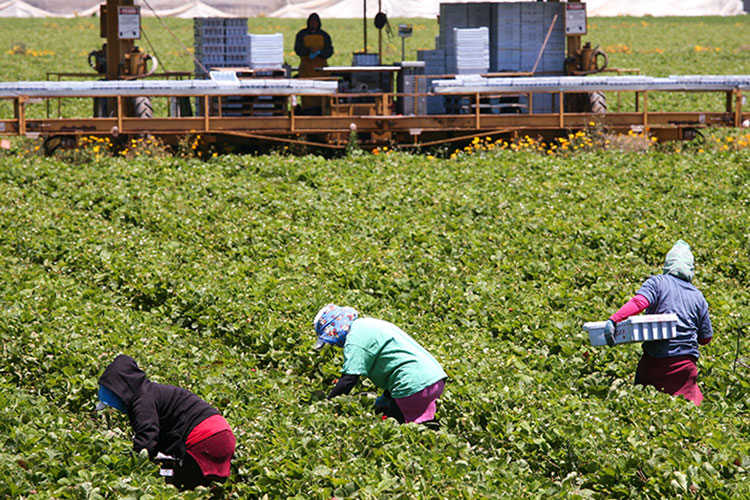
A December study by researchers at UC Berkeley was the first to look at the risk factors for, and prevalence of, COVID-19 in farmworker communities. (Photo by Alex Proimos via Wikimedia Commons)
California farmworkers hit hard by COVID-19, study finds
Many farmworkers who plant and harvest our food are forced to live and work under conditions that are ripe for transmission of COVID-19. During the summer harvest season, coronavirus outbreaks popped up across the nation among farmworkers in agricultural communities, including many in California.
In a white paper published in December, public health researchers at UC Berkeley detailed preliminary findings from the first long-term study on the prevalence of, and the risk factors for, COVID-19 infection among California’s agricultural laborers.
Also, read “Dalia Rangel Perez on breaking the cycle in Coachella Valley.”

In the diagnostic test, a patient sample is mixed with CRISPR Cas13 proteins (purple) and molecular probes (green) which fluoresce, or light up, when cut. When coronavirus RNA is present in the sample, it prompts the CRISPR proteins to snip the molecular probes, causing the whole sample to emit light. This fluorescence can be detected with a smartphone camera. (Image courtesy of Science at Cal)
New CRISPR-based COVID-19 test uses smartphone cameras to spot virus RNA
Scientists at UC Berkeley and Gladstone Institutes developed a new CRISPR-based COVID-19 diagnostic test that, with the help of a smartphone camera, can provide a positive or negative result in 15 to 30 minutes, as outlined in a study published in December. Unlike many other tests that are available, this test also gives an estimate of viral load, or the number of virus particles in a sample, which can help doctors monitor the progression of a COVID-19 infection and estimate how contagious a patient might be.

Despite his authoritarian tendencies, President Donald Trump’s supporters have stayed with him because they believe he understands and respects their struggles, UC Berkeley scholars said. (Photo by Gage Skidmore via Wikimedia Commons)
Despite drift toward authoritarianism, Trump voters stay loyal. Why?
In December, after more than a month had passed since the fiercely contested U.S. presidential election, and the nation’s institutions were moving day-by-day toward acceptance of the outcome that made Democrat Joe Biden the winner, President Trump was neither conceding nor moving on — and, it appeared, the same was true for millions of his supporters.
In a series of interviews, UC Berkeley scholars across a range of disciplines suggested that this is a story not just of numbers, but of a complex interplay of class and racial antagonism, aggravated by despair and social drift and amplified by new communication platforms, converging to what some see as a troubling psychological phenomenon.
Jennifer Doudna’s Nobel Prize ceremony was a day to remember
For Nobel Prize winner Jennifer Doudna, a UC Berkeley professor of chemistry and of biochemistry and molecular biology, the highlight of Nobel Week was a socially distanced award ceremony on Dec. 8 on her patio in Berkeley with 11 people in attendance, followed by takeout food. But if the glow on her face was any indication, she could have been receiving the medal and citation from the King of Sweden on the stage at Stockholm Concert Hall. The traditional celebration would wait until next year.

In San Francisco, William Oberst receives a bag of masks made by the Common Humanity Collective during a Dec. 7 PPE giveaway by nonprofit group Code Tenderloin. (Photo by Brittany Hosea-Small)
As COVID-19 cases rise, so does mutual aid effort launched at UC Berkeley
Eight months after a Ph.D. student and a research assistant turned a UC Berkeley lab into a makeshift hand sanitizer factory, soon producing nearly 500 gallons a week for free distribution to Bay Area residents in need, the project had grown into a formidable mutual aid organization in California during the COVID-19 pandemic. Once under the radar and defying a name, the operation began to call itself the Common Humanity Collective, fitting for the cooperative enterprise that it became.
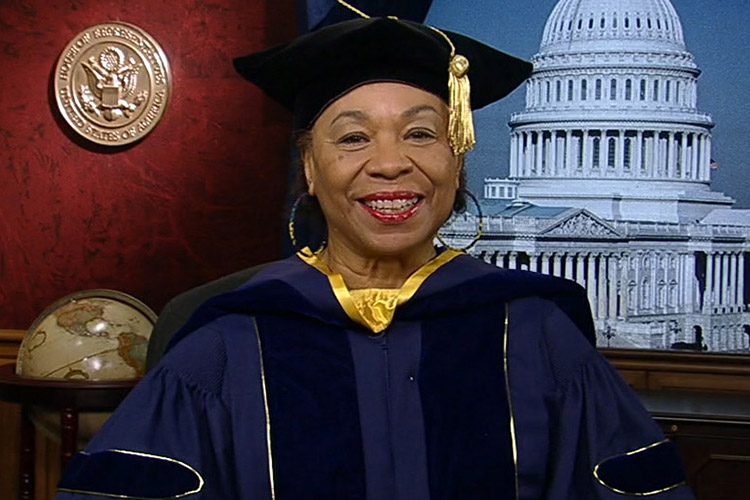
Congresswoman Barbara Lee congratulated UC Berkeley’s winter 2020 graduates in December.
Rep. Barbara Lee to December 2020 grads: ‘Through these challenging times… You did it’
In December, UC Berkeley student leaders joined Chancellor Carol Christ and keynote speaker California Congresswoman Barbara Lee on Dec. 19 for a virtual commencement ceremony to applaud Berkeley’s winter 2020 graduates for their perseverance, grit and hard work to complete their degrees in the midst of a global pandemic.
Also, read graduating student Katalina Cortez’s story about finding her cultural identity to pay it forward.
